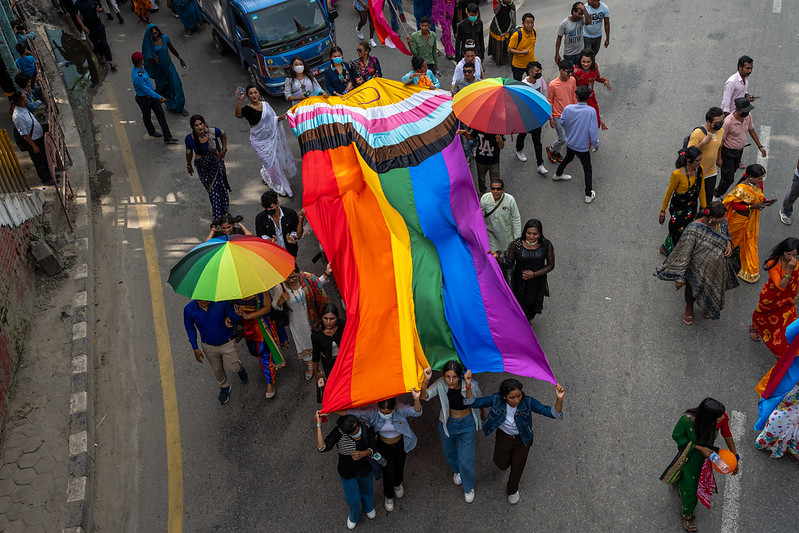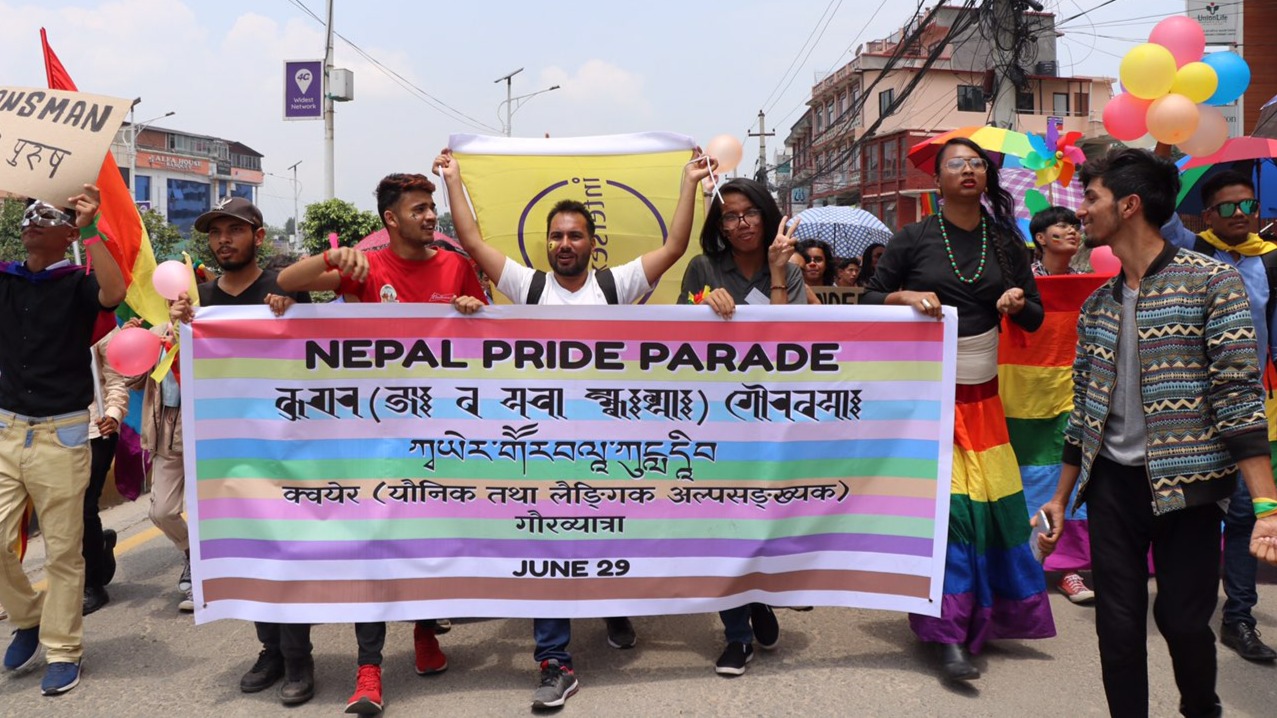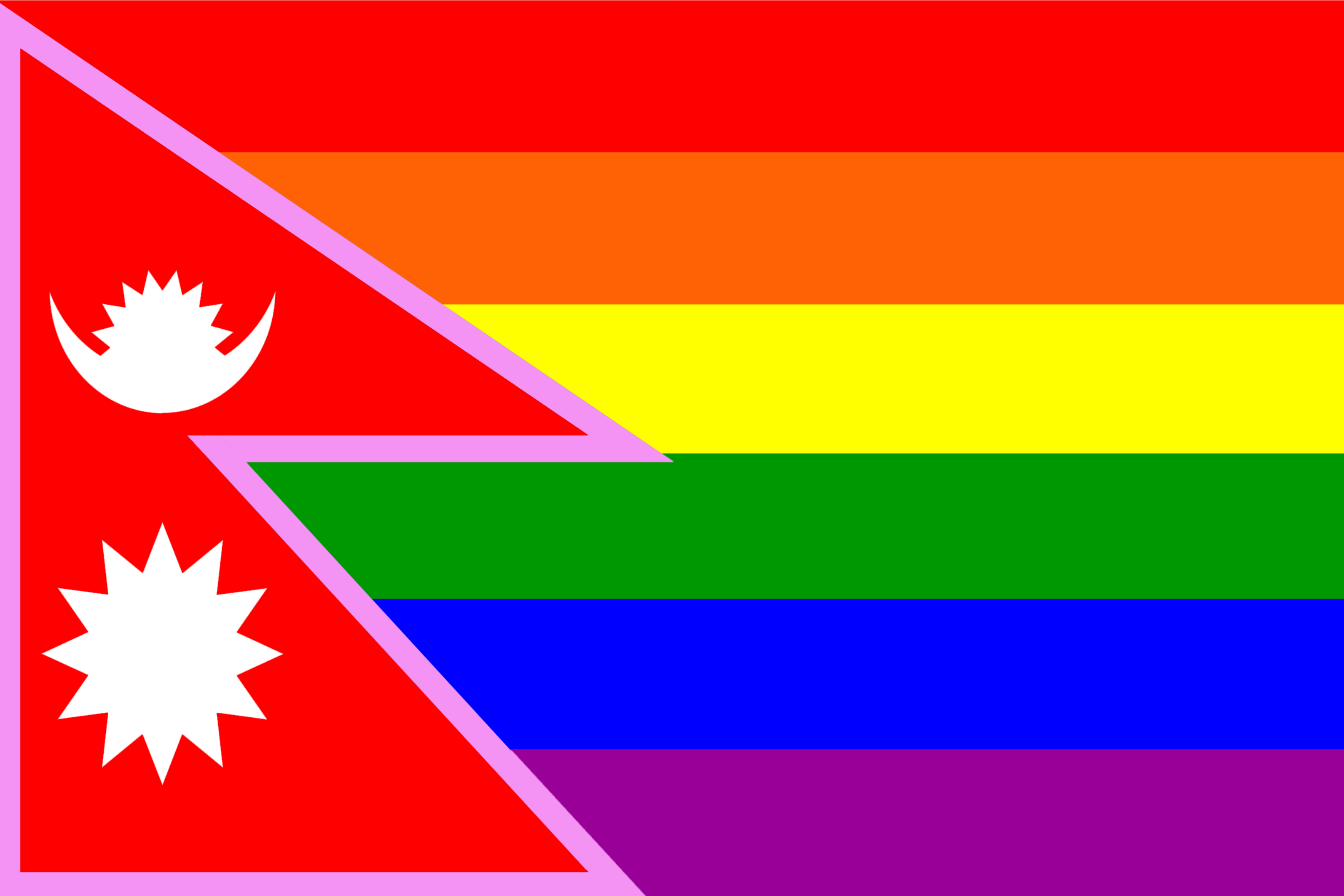June 02, 2025
Kathmandu, Nepal

Participants at a pride parade in Nepal in 2023
Photo: Flickr/ US Embassy of Nepal
A single decision by a political leader from a developed country to withdraw foreign aid can trigger crises. Who would have thought that this would be the reality of many countries like Nepal? Yet, this is the reality we live in today.
And what about the different communities that depended on these aids? Nepal’s queer community is one such often-overlooked community that depended on the foreign aids and have seen some adverse impact on their lives. Today, some four months after the US foreign aid was put on hold, the impact is visibly increasing.
Nepal, being one of the least developed countries, has always relied heavily on its neighboring countries, like India and China, for trade, education, healthcare, and infrastructure. Like many countries in the Global South, it also heavily depends on other developed nations, such as the USA and the UK, for other areas of development, imports, aid, and support in various aspects, including employment opportunities.
So when even one of these donor organizations suspends funding, it ripple effect is not just in development efforts but also the lives of the thousands of individuals in the sector, forcing them to stand at the crossroads of limited government jobs and seeking opportunities abroad and the ‘queer brain drain’ is even more heightening now. The queer community is neither acknowledged by the government, nor are there any opportunities to improve their lives in Nepal.
“We’ve become so donor-oriented,” Rajani Thakali, the Program Coordinator of Naulo Bihani, Pokhara, observes, “We never developed income-generating skills. The focus had to be only on healthcare, not leadership or sustainability.”

Pride parade in Nepal
Photo: Flickr/ US Embassy of Nepal
The effects of aid withdrawal are even more severe for the queer community, which not only faces heightened vulnerability to job insecurity and resource scarcity but also systematic marginalization. Nepal’s queer community remains legally unrecognized by the state even today. The community, at different instances, has voiced out that it is a result of the lack of discourse at the governmental level and the lack of thorough and disaggregated data in the census.
This invisibility not only erases progress but weakens advocacy efforts that were just beginning to bear fruit. Without data—such as the number of openly queer individuals—organizations are finding it harder to make their case for continued support, specially from Nepal government.
Program Coordinator Thakali says, ”Compared to other marginalized groups like women or dalits, we receive relatively less attention and funding from the Nepal government, queer communities have remained sidelined. And if we keep facing the lack of budget, our existence will go extinct”.
She further discuses how difficult it is for the queer community to get a job, to get proper health services and visibility in the society. To live by, the community inherently became dependent on foreign aid. “Some municipalities and wards do support us, but it is limited to a token allocation of around USD 200 per fiscal year for our cause. This amount is barely sufficient for a single awareness event, let alone a functioning year-long program.”
For queer organizations in Nepal, USAID funding was more than just money—it was a lifeline that enabled them to advocate, provide healthcare, and create safe spaces.
The funding withdrawal has led to the closure of numerous NGO-operated centers, particularly those serving marginalized communities. For instance, centers supporting the LGBTQ+ community, such as the Parichaya Samaj in Kathmandu, have shut down, leaving thousands without access to essential health services and support. This shows the discourse and the concerns about it all over the place.
Organizations like Naulo Bihani of Pokhara have long been involved in HIV prevention and treatment, but now it trembles for existence, on the edge of collapse. Thakali briefs, “We’ve been providing HIV services through our clinics, in a safe environment. But now people have to go to government hospitals where they fear stigma and discrimination.”
And with the aid withdrawal, they have had to discontinue their services, impacting those who depended on their institutions. “Some beneficiaries who do not understand the mechanisms of the funding process have even started being upset about our service discontinuation and also questioning the credibility of our institution.”
Perhaps most heartbreaking is the human cost of this financial withdrawal. Many trans women, once part of community-led initiatives or outreach programs, have even been forced to return to sex work. Isolated and jobless, they are moving farther from urban centers in search of survival. “They’re staying idle now,” says Rajani. “We may not even be able to find or connect with them soon. Everyone is demoralized.”
This regression underscores a harsh reality: without sustained support from the state itself, gains made by marginalized communities based on the government can evaporate overnight.
In the context of Nepal, from the pioneer organizations like Charkha Pracharak Mahaguthi, founded by Tulsi Mehar Shrestha, to the rise of Maiti Nepal by Anuradha Koirala, and now thousands of locally registered NGOs, most have depended on external funding.
The main sources of these funds are international NGOs (INGOs), development partners, and philanthropic institutions such as the United Nations, Plan International Nepal, UKaid, and The Asia Foundation. These organizations contribute significantly to Nepal’s education, healthcare, infrastructure, agriculture, arts and culture, gender equality, and governance sectors.

Nepal Pride Parade
Photo: Wikimedia Commons/ AllyProud
Donor agendas have often dictated the scope and lifespan of social progress for queer community to the extent that when funding dries up, they will have to go back to the sex works and migrate to the neighbouring country India.
Since the external agencies, in compare to Nepal government, are more interested to invest in the issues of the queer community. The external funds are the only means to support the livelihood of this community. The underlying dependency on foreign aid got even more apparent once the aid was withdrawn, and so was the fragility of Nepal’s development model that sidelined the community. The absence of state recognition further pushes into their exclusion, deepening the crisis they face in an already unequal landscape.
In an interview with DevPulse, local NGO leader and trans activist Pareena Chaudhary from Nepalgunj expressed her concerns, “If we get good funding, we can sustain, but it’s uncertain what the future holds in this sector.”
In cities like Nepalgunj and Surkhet, many people rely either on jobs in India (especially people from western Nepal taking up blue-collar work) or employment in NGOs. For these communities, the necessities of life are threatened when external funding is withdrawn.
The visibility that queer individuals had started gaining in public and professional spaces just recently is now slipping away with this break in the aid. On the surface, it may appear to be a matter of geopolitical or diplomatic relations, but in reality, it’s much more about dependency.
So, is USAID’s withdrawal a curse or a blessing in disguise?
Is this the right time for a country like Nepal to turn this development crisis into an opportunity?
Could this be a moment to look inward and build self-reliance to work on autonomy?
In the immediate term, it feels like a curse. The sense of abandonment is palpable, and the consequences—loss of services, dignity, and livelihood—are real. But perhaps, hidden within this hardship is a wake-up call.
This moment could catalyze a long-overdue reckoning. It challenges Nepal to reimagine its development strategy, moving away from donor dependency and towards self-sufficiency. It calls on the government to legally recognize queer community and allocate meaningful resources. It also prompts civil society to prioritize capacity-building, leadership training, and income generation alongside service delivery.

Nepal Gay Pride Rainbow Flag
Photo: Wikimedia Commons/Everest Chandra Ra Surya
The road ahead will not be easy. For Nepal to break free from cyclical aid dependence, a broader economic shift is essential. But maybe, just maybe, this crisis will force a reckoning that empowers Nepal’s queer community to rise stronger—on its terms. This shift is only possible if Nepal develops inclusive and practical policies, such as reducing high taxes on local private companies, to promote domestic growth.
Instead of consistently depending on neighboring countries and foreign aid, Nepal should take strong diplomatic steps to reduce tariffs on international trade and create an environment where local industries and institutions can thrive independently, and to promote a free market.
Nepal's government, its subsectors, and stakeholders should delve deeper into rethinking this act by the U.S. government. Nepal, its development, and all progress it has made over the years have been closely tied to external funding, but the future cannot be.

By sharing valuable information and sparking inspiration, we aim to foster growth, innovation and brighter opportunities for future generations.
Contact us